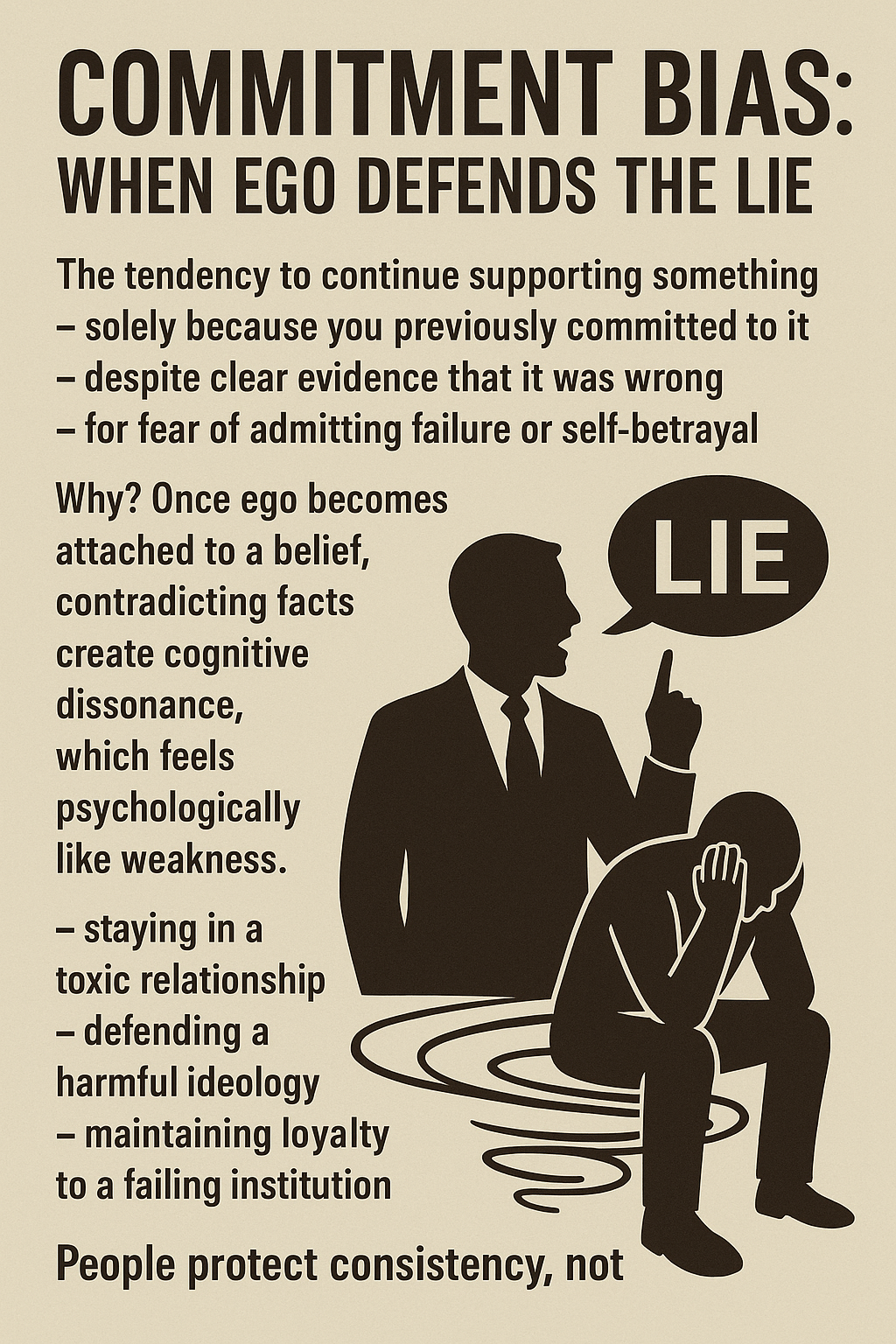I. Introduction: When Loyalty Replaces Logic
People don’t stay loyal to truth—they stay loyal to what they’ve already declared, publicly committed to, or built their identity around. This psychological pattern is called commitment bias, and it explains why so many individuals:
- Stay in toxic relationships,
- Defend political ideologies that harm them,
- Remain loyal to corrupt institutions, and
- Continue believing lies—even after being shown the truth.
In the psychology of power, the hidden force that keeps people chained not to reality, but to reputation.
II. What Is Commitment Bias?
Commitment bias is the tendency to:
Continue supporting a belief, behavior, or decision simply because you previously committed to it—even when evidence shows it’s wrong.
Why? Because the brain craves internal consistency over truth. It values the feeling of “I was right” more than “I’ve grown.” And when a belief becomes public, ego becomes armor.
III. How It Works: The Stages of Self-Trap
- Initial Decision
- You say yes. You believe. You invest time, energy, or emotion.
- Public Declaration
- You defend it out loud—whether it’s a political candidate, a spouse, or an ideology.
- Now your identity is attached.
- Contradictory Evidence Emerges
- Facts no longer align with your stance. You feel internal conflict.
- Cognitive Dissonance and Ego Defense
- Instead of re-evaluating, your brain protects your past choice, not the truth.
- Logic feels like betrayal. Doubt feels like weakness.
- Deepened Commitment
- You double down. You begin defending yourself through others—a politician, a church, a brand.
- The issue is no longer external. It’s personal.
IV. Why People Stay in Harmful Situations
- A miserable job: “I’ve been here for 15 years. I can’t start over now.”
- A toxic relationship: “But I said I loved them. If I leave, what was it all for?”
- A destructive ideology: “I campaigned for this. I donated. I recruited others.”
The loss of the belief now feels like a loss of self. Changing your mind becomes synonymous with failure.
“People don’t defend the lie—they defend the version of themselves that believed it.”
V. The Power of Public Labels and Declarations
Why do politicians, cult leaders, and corporations love slogans, pledges, and mantras?
Because once someone says something out loud, they begin to feel it must be true.
- “I support this candidate.”
- “This brand aligns with my values.”
- “I stand with [insert cause here].”
Now, even when their support fades internally, they’ll keep defending it publicly—because to change their stance feels like humiliation or betrayal.
VI. Strategic Use of Commitment Bias
Authoritarian systems, ideologues, and marketers use this psychology to secure loyalty beyond reason:
- Cults require public renunciations and praise sessions.
- Brands push identity: “We’re not just shoes, we’re who you are.”
- Politicians weaponize tribal loyalty: “If you don’t support me, you’re against the cause.”
These systems know:
Once someone says it out loud, they’ll twist themselves into knots to prove it’s still true.
VII. The Cost of Denial
Commitment bias can cause:
- Moral stagnation: Never re-evaluating your values.
- Relational dysfunction: Staying in betrayal because you once promised loyalty.
- Political blindness: Supporting leaders long after they’ve abandoned your interests.
- Spiritual deception: Confusing tradition with truth.
VIII. Breaking the Chain: How to Defeat Commitment Bias
- Practice Humility
- Admitting you were wrong is not weakness—it’s the first sign of wisdom.
- Separate Identity from Belief
- “I believed it then. I’ve grown since.” This is maturity, not betrayal.
- Reward Yourself for Changing Your Mind
- Don’t fear contradiction—celebrate progress.
- Seek Environments That Value Truth Over Loyalty
- Surround yourself with people who challenge you, not just cheer for you.
- Use Commitment Bias Strategically for Good
- Make public declarations of truth, integrity, and repentance—not ideology.
- Let your ego attach to virtue, not image.
IX. Final Reflection: The Trap Is Not Believing a Lie—It’s Needing to Be Right
The real tragedy isn’t the lie—it’s the unwillingness to let go.
“People don’t stay loyal to truth. They stay loyal to the image they’ve built in front of others.”
Until we reclaim the courage to say, “I was wrong,” we will continue to worship the past—and destroy our future for the sake of our pride.






